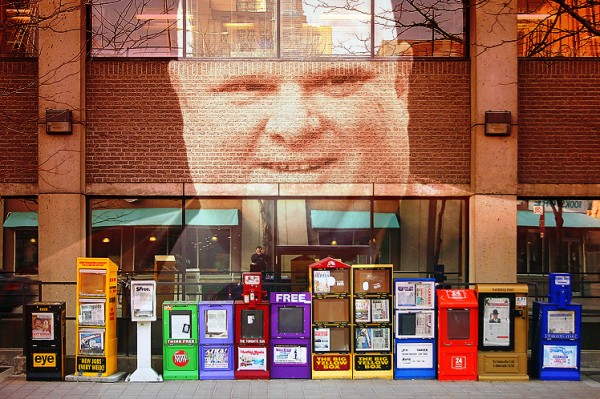Will Mayor Rob Ford’s bid for re-election become the place where political journalism goes to die?
This question has been buzzing around in my mind ever since the week from hell, when our crack-smoking, drunk-driving, soft-on-(his own)-crime mayor kept popping up on network television, repeating fabrications as brazen —pun intended — as any I’ve heard in my career.
Several Toronto media organizations, which have worked heroically to unearth details of Ford’s shameful conduct, chimed in with dutiful and meticulous fact-checking: No, the $1 billion savings figure is not accurate. No, the City was not going into receivership in 2010. No, the recovery is not specifically attributable to him. No, the most recent tax increases are not the lowest on record, etc.
And while all this journalistic due diligence is unquestionably necessary, I find myself wondering if it will be sufficient in terms of informing a deeply polarized public about the non-fiction version of the mayor’s legislative record.
Ford, clearly, doesn’t care. As with Stephen Harper, the mayor’s messaging is always far more important than the content, to the point where the factual underpinnings become incidental and eventually disposable.
This insidious uncoupling of the political rhetoric and the empirical foundation poses a huge credibility problem that ends up backfiring on the media.
In my experience, politicians and governments display a wide range of stances towards the “truth.” Most spin and exaggerate their own records, and many commit sins of omission. Certain politicians have such a command of the arguments and the data that they can persuade voters to doubt their own beliefs. Some lie, and a subset of those lie all the time, often about things that they don’t need to lie about.
Exhibit A: Ford last week claimed he’d been held up by well-wishers in a restaurant for four hours while he was trying to leave with his family. A bald-faced lie. Yes, I can see a longish delay on the way to the door. But four hours? The content of the claim is not important. But the mindset behind it suggests someone utterly indifferent to the relationship between word and deed.*
If the speaker was goofy old Uncle Rob, who tends to have a few too many when he comes over for dinner, we’d all exchange vaguely embarrassed glances, and then change the topic before he goes off on some other awkward tangent.
But the speaker is (i) an elected official (still); and (ii) someone with a very large megaphone. How do I know about the four-hour remark? It was on TV.
Many commentators noted that Ford made numerous unchallenged nose-stretchers during his interviews with Fox, CNN, and even Peter Mansbridge. Those commentators subsequently inventoried the false claims, and now we have those corrections in the public realm to aid us in our understanding. But what if that kind of reporting doesn’t take?
To illustrate, try this thought experiment: pretend that Ford had said, on CNN, Fox, and the CBC, that Toronto’s economic recovery is due to all those “Orientals” who “work like dogs.” Or, more darkly, that welfare payments to “Pakis” — a phrase attributed to Ford (in the Lisi court documents) who directed it at a taxi driver on the infamous St. Patrick’s Day party night — had caused the city’s budget to swell.
He hasn’t done any of these things, but I raise the question to make a point about what the media will and will not repeat. At a certain point, news organizations must make editorial choices — obviously not in concert, but nonetheless responding to the same events — about when they cross the line from critical reporting to the mere amplification of problematic statements.
Years ago, for example, a Toronto neo-Nazi named Ernst Zundel successfully manipulated a complaint that forced the media into broadcasting his views on the Holocaust during a sensational and deeply regrettable trial in which he had been charged with knowingly disseminating false information. He left court each day with a broad grin, reveling in the attention he would otherwise never have received.
Ford, of course, is not a hate-monger, but he and his brother certainly do understand how to manipulate the media to broadcast false or outrageous claims.
I’m guessing some TV news organizations have had internal discussions about endlessly re-airing the mayor’s abusive remarks about his former staffer and wife for precisely these reasons. Why, I wonder, should the ceaseless repetition of patently false campaign-style claims be treated differently?
I’m not a prude: politicians and governments always want to cast their records in the best possible light, and often that means over-interpreting the available data or ignoring inconvenient details. Journalists are paid to challenge and counter political claims, and that’s as it should be, most of the time.
But Ford is uninterested in tethering his accomplishments to an even vaguely plausible fact base. He’d like voters to accompany him to that parallel, consequence-free universe where rolling apologies make all problems go away, and where black is white and white is black.
John Barber, writing in The Star on the weekend, provided a scathing “I-told-you-so” directed mainly at voters who, he argues, knowingly put Ford in office despite much available evidence to suggest he was uniquely unsuited for the job.
As the city stumbles towards the official 2014 campaign start date, in early January, there is obviously an enormous amount of debate about how to prevent lightning from striking twice.
Notwithstanding the exceptional investigative reporting of the past year, it seems to me that we in the media must look in the mirror and ask ourselves if or how we’ve been knowing or unwitting accomplices — enablers — to the dissemination of countless serial falsehoods that have had an expressly damaging impact on the City’s business and public discourse about local government.
So should the media choose to stop broadcasting Ford’s dissembling about his record until he begins to observe at least some truth-in-advertising principles?
As a journalist, I find that solution to be practically and philosophically troubling. The media plays a critical role in ensuring his statements – from the confessions to the vulgarities to the outright lies – are part of the public record, and therefore available to citizens and political opponents to cite and critique.
But Leslie Scrivener, writing in The Star yesterday, points out that the sort of “shunning” that took place after he made crude on-air remarks about a former staffer could be an effective tool for behaviour modification. “Turning one’s back is a classic way of showing disapproval,” she observes.
“Should media mikes be turned off for a while?” Scrivener wonders.
It’s a question worth asking. After all, Ford has always flatly refused to operate within the broadly accepted norms of political engagement and discourse.
If he’s using a different playbook, perhaps we in the media need to as well.
photo by Sam Javanrouh; illustration by Matthew Blackett
![]()
* Doug Ford’s dissembling runs to groundless political attacks on his rivals and claims about his own conduct. Soon after he was elected, he bragged that he incurred no office expenses of any sort, a politically unnecessary contention I debunked in The Globe and Mail with an access to information request that revealed the lie.






13 comments
Thanks for this, John. The bald-faced lying currently so prevalent among many elected officials has dismayed me for some time, given the disinclination for many voters to read beyond the headlines. Perhaps the headlines themselves ought to include counterarguments? Something like FORD’S FIGURES DON”T ADD UP might do it. Of course, these days, most of the news would read that way: just sticking to Canada, we would have WRIGHT MISREPRESENTS WHEN DECISIONS WERE MADE, or HARPER CONTINUES TO DENY THE PUBLIC RECORD, etc etc. Still, it would be better than obligingly broadcasting the sound-bite liars want the media to send out for them!
An intriguing idea to consider, given the situation at Nathan Phillips Square right now.
As for Barber’s assertion, there’s an implication in it that some voters chose in favour of Rob Ford because they knew him to be unsuited to the job…we can make a fair guess as to why some would do so. it would be interesting to have confirmation of that implication…and not a little frightening as well.
It does seem to be far more of a world of Delusion is the Solution to problems – but it goes far beyond the Fords to such details as climate change, where the news of we in Canada getting a special lifetime unachievement record is underplayed.
http://www.dhakatribune.com/world/2013/nov/23/big-event-set-end
It’d be nice to have explorations of our denial of how cars are subsidized; that’s a hard one to get into the mainstream press given the degree of car-ad dominance, though in merely 1996, a Vancouver study suggested a $2700 per car per year set of extra costs avoided by car drivers.
The war on the car doesn’t believe in this of course, yet as we head into a budget process, surely we need to take our heads out of the tailpipes and balance the user-pay for transit with the user-pay for private mobility, (though I’m not saying that they aren’t costly to run and operate already – they are; and at many times and places, there’s an argument for “needing” them.)
The Fords need to be placed in context of facts not mattering: to deflate them, maybe we need to get a re-set on the fiscal conservatism handle and talk about the elephants in our living rooms, kitchens, driveways, etc… and push for the Vehicle Registration Tax being reinstated in one form or another. As we have some degree of sidelining, the Councillors are aware of extra scrutiny, and might be more open to suasion and logic, though “votorists” are everywhere, and privileges don’t wither readily.
The interviewer or moderator going soft with Rob Ford, expect a hard battle.
This article reminded me of this:
Reality-based community is an informal term in the United States… The term has been defined as people who “believe that solutions emerge from judicious study of discernible reality.” The source of the term is a quotation in an October 17, 2004, The New York Times Magazine article by writer Ron Suskind, quoting an unnamed aide to George W. Bush…:
The aide said that guys like me were “in what we call the reality-based community,” which he defined as people who “believe that solutions emerge from your judicious study of discernible reality.” … “That’s not the way the world really works anymore,” he continued. “We’re an empire now, and when we act, we create our own reality. And while you’re studying that reality—judiciously, as you will—we’ll act again, creating other new realities, which you can study too, and that’s how things will sort out. We’re history’s actors…and you, all of you, will be left to just study what we do.”
—
From Wikipedia: http://en.wikipedia.org/wiki/Reality-based_community
Toronto’s no empire, but fighting political framing with fact-based analysis is what we often do. Sometimes it feels like we’re yelling at a tornado.
Ideally, aside from not bothering to report on his lies, the media would just not cover him at all anymore (aside from perhaps if this whole criminal activity thing ends in something bigger than it is now). I am glad to see that the truth that the Star began reporting on months ago has now (mostly) come to light and that it has damaged him as much as it is likely to. I think the media needs to recognize that it has always played a role in determining who the major candidates are. It’s more difficult with an incumbent, of course, but I have often wondered what would have happened if the 2010 mayoral campaign coverage had focused on a different set of candidates, instead of covering Ford to the degree that he was in the front of every voters mind at all times (even if it was all negative, it was still coverage). I think it’s time to ignore this clown and let him fade into the background. If we decide in October that we still want a conservative mayor (though I personally don’t and won’t), it should be because they are the right candidate, and not because they are the loudest and most visible. The people of Toronto would benefit on many fronts from a Ford media blackout.
As long as there are enablers in the media, such as Joe Warmington or Stephen LeDrew, who are willing to let Ford’s views have an uncritical errand, any shunning by the rest of the media will be counterproductive. And there will always be someone willing to defend him.
Most of what he says are the same talking points and slogans over and over. They’re not news so don’t report till he says or does something new and different.
Nice piece, as usual, on a dismaying reality. The Fords’ deliberate disregard for informed research, judicious decision-making, respectful discussion, democratic process, and on, and on … has its precise analog in the provincial legislature where howled denunciation is offered up in place of reasoned debate and, again, in the House of Commons where, today, Andrew Coyne accurately characterized the Prime Minister’s parliamentary secretary’s approach to question period as that of a ringmaster conveying the government’s contempt. Coyne: “It’s deliberately nonsensical, intended to make reasoned criticism pointless, if not impossible. It’s dada, basically. We’re a dadaocracy.” The lying, misinformation and constant, apparently instinctive resort to manipulation and spinning by Ford especially, but also by others who share his simplistic world view, are dismaying because truth and reason appear to be so ineffective a response. To much of the electorate, the lie is more appealing, and the liar more compelling than his reality-bound opponent. Those who plead for the truth sound, by comparison to the Fords, like whiners. Perhaps the media can help by turning away from some of the liars some of the time, but the problem is more than the media alone can solve.
at the end of the day the words below quoted from the article convinced me that rising above our baser human instincts is the wisest decision: it is better to report than not.
“The media plays a critical role in ensuring his statements – from the confessions to the vulgarities to the outright lies – are part of the public record, and therefore available to citizens and political opponents to cite and critique”.
“Ford, of course, is not a hate-monger.” I disagree.
In fact, that is exactly what he is. It may be tiresome to have to start at the beginning, but who can forget the offensive and hateful pronouncements by Don Cherry at Ford’s inauguration?
It’s visible today in the twisted snarl with which Ford confronted Denzil Minnan-Wong, his former ally, on the floor of Council for all to see.
Unfortunately the Fords are untainted by even a little judicious self-hatred which might actually humanize them.
The lies? They’re part of the package. They support and are supported by this unseemly and contrived division of our citizens into us and them. A more critical and sophisticated level of reporting, which actually seems to be coming out of the insanity of the past year, can only help to disarm Ford’s grip. The question is can the media help promote a necessary skepticism among the general public when faced with the barrage of pandering lies a public figure like Ford is continually spouting off?
As an engineer, MBA and worse of all a Queen’s Scout, who could no more misrepresent numbers, let alone lie about them… John’s article strikes a chord with my fun-with-numbers analytic side… as you’d expect of someone who created his annual TTC FACTsheet in the naive hope it would replace political spin with analytic discipline on the hopeless TTC/GTA Public Transit file.
Ford had a City of Toronto CFO (or some other accountant type person) on his radio show who confirmed the savings of $1B. Can this guy be identified and interviewed – it seems he is lending credibility to Fords claims of cost savings and until he is interviewed, Fords claim will stand.